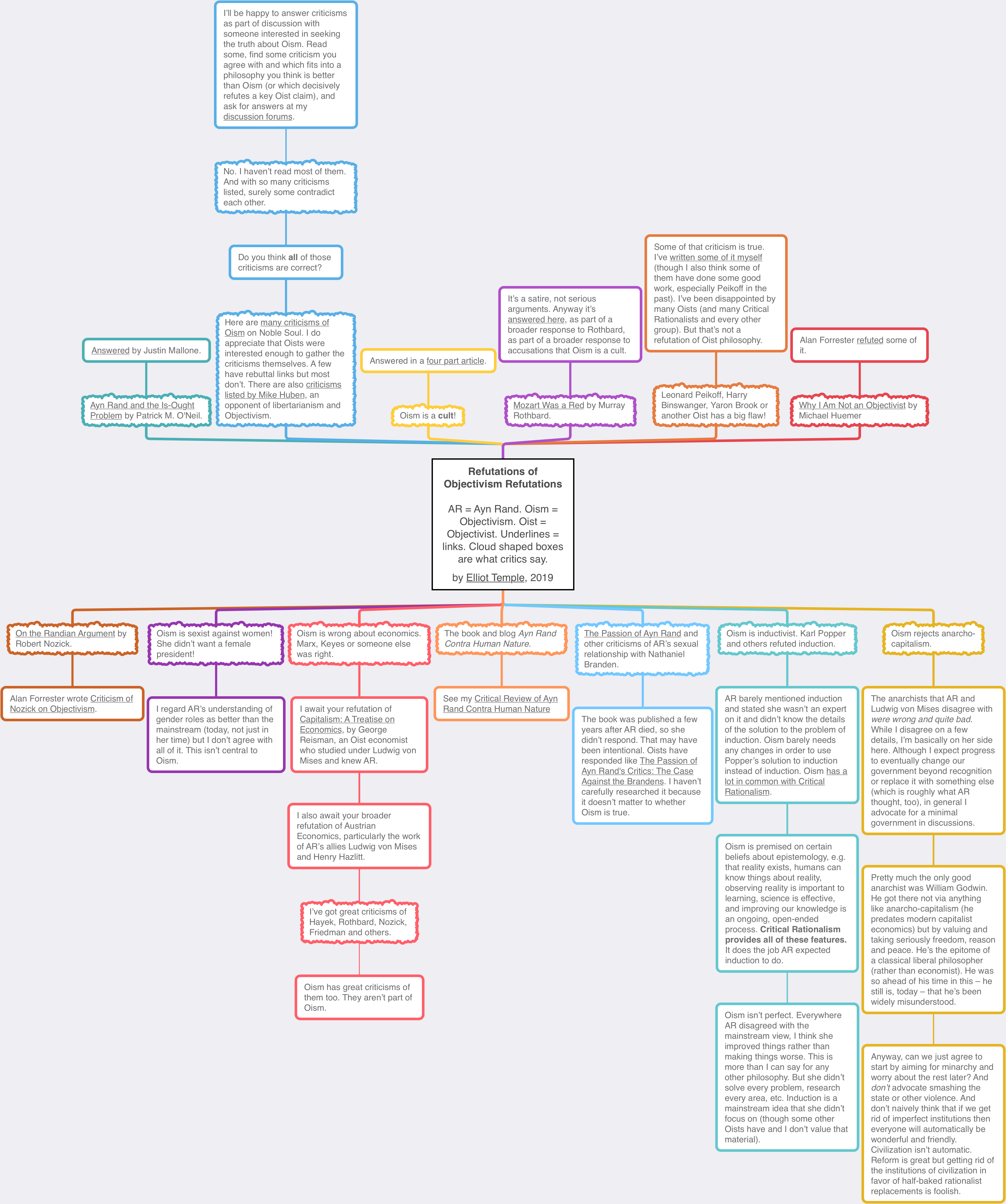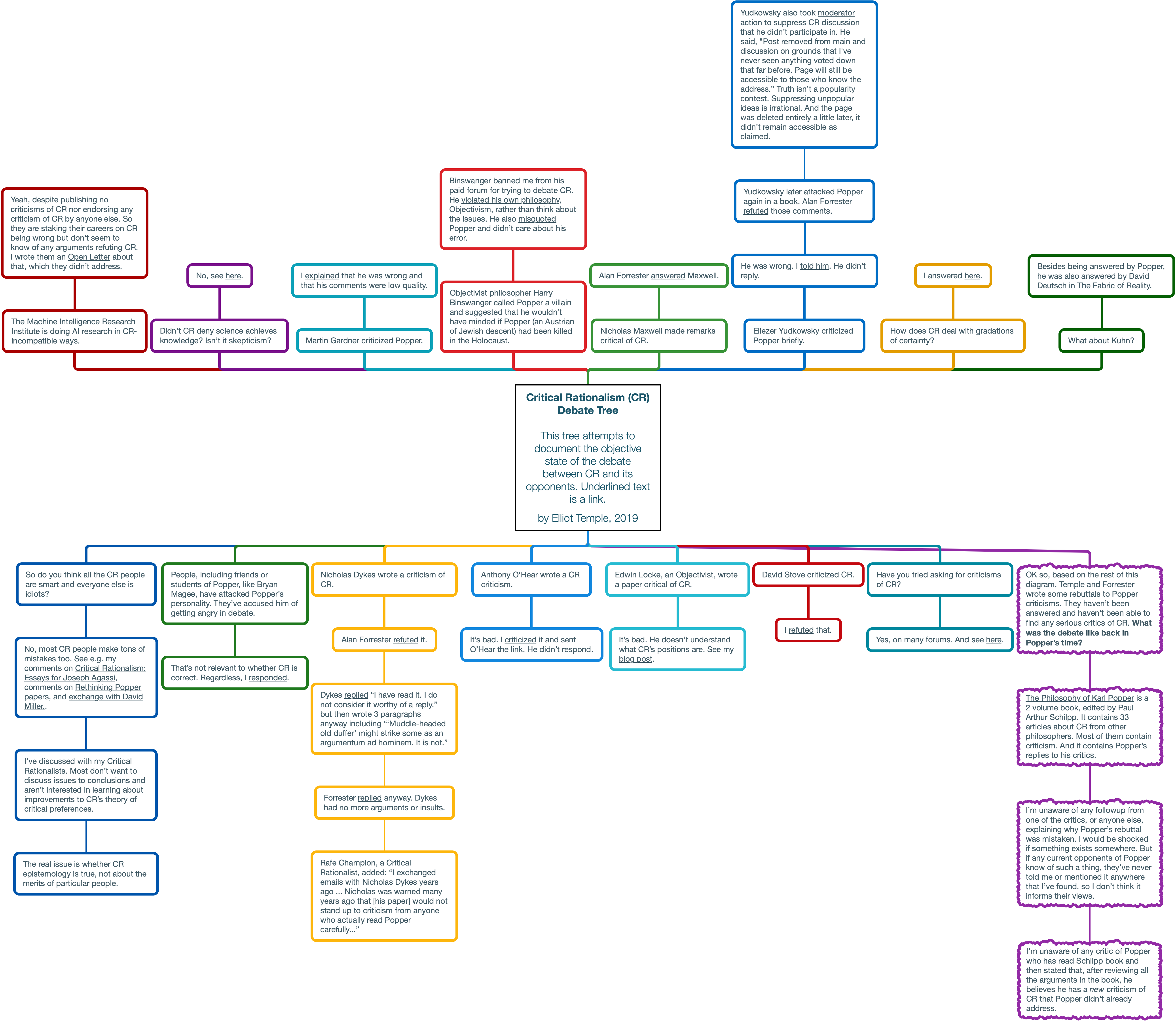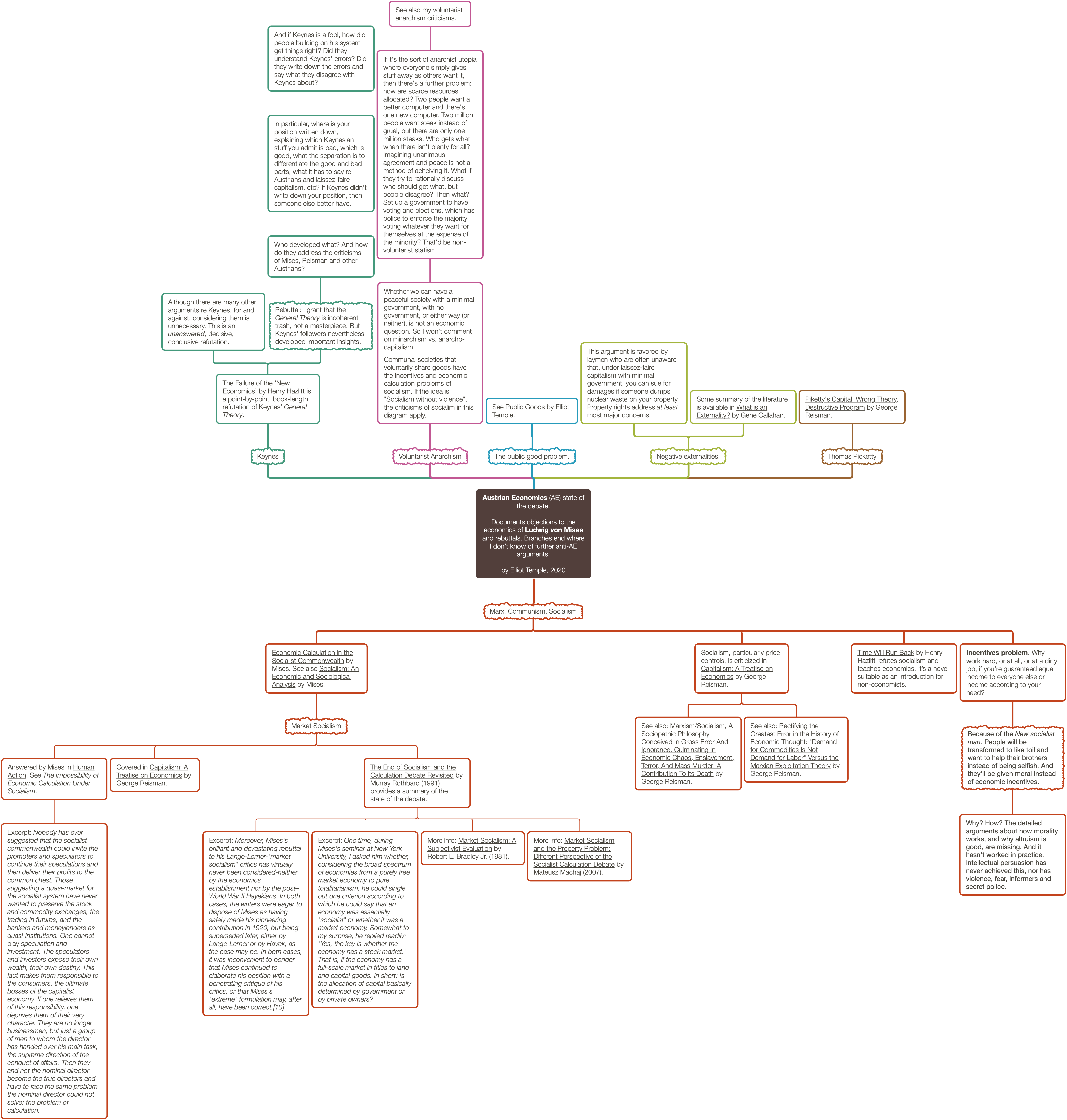This is part of a series of posts explaining the harassment against me. This post shares background info about my conflict with David Deutsch. I’ve tried to address the problem privately but he’s refused to even attempt private problem solving or common preference finding.
The closest thing to a reason that David Deutsch (DD) ever gave me for turning against me was that he was upset about the TCS archives issue. I never considered that explanation to be very good. In short, he didn’t want them published and I agreed not to publish them. Would he really end ten years of friendship and productive discussions over that!?
I’ll explain what happened, then after that I’ll give additional facts, quotes, details and sources.
Taking Children Seriously (TCS) was a parenting and educational philosophy co-founded by DD and Sarah Fitz-Claridge (SFC) around 1992. They, I and others believed that TCS had very important ideas which all parents should learn and which could dramatically improve the world.
TCS List was a public email discussion group that started in 1994. The archives were tens of thousands of emails posted in the past. I joined in 2001. In 2002, DD and I both wanted to share the discussion archives with millions of parents so that they could learn to treat their children better.
For years there were automated, public archives which were searchable and downloadable. There were instructions on how to do this. Everyone was warned not to post anything private. But eventually AOL limited and/or removed archives for all their groups. In my understanding, that was because they didn’t want to store the data or spend money on the groups, and that change was a precursor to the groups being poorly maintained for years and then eventually being shut down entirely. So the archives needed to be reposted elsewhere.
In 2007, SFC and Kevin (SFC’s tech guy) wanted the archives to be posted on a public website and were working on making that happen. They publicly announced this and Kevin told me that the only obstacle was the software work necessary to make it nice.
Because SFC and Kevin were not very involved with TCS anymore starting around 2003, and didn’t get much done, I got a copy of the full archives for myself. I wanted to read it and I was also interested in sharing it with the world because no one else was getting that task done. I got my full copy of the archives from Lulie, who got it from Kevin. Before that, I had archives starting in 2002 (all the emails since I joined the group), plus some additional, incomplete, older archives that I’d gotten from several other people.
I believed the only obstacle to sharing the archives was getting the data and making a website for them. I believed sharing the archives was just restoring the previous status quo – getting TCS back to where it was before AOL changed their archive software.
At some point between 2002 and 2010, DD changed his mind about sharing archives. He no longer wanted them shared. But he didn’t tell me (or I think anyone else, at the time) that he had changed his mind. DD belatedly let me know there was an issue after I was already in the process of sharing the full archives. He could easily have told me earlier because we were talking regularly and he knew what I was doing (I didn’t go behind his back about any of this).
In 2010, DD told me that sharing the archives would be bad, and that he’d explain why after he was done writing his book, The Beginning of Infinity. So, to accommodate him, I waited for over a year. Then DD still didn’t want to explain and got upset with me for expecting him to explain. If he didn’t want to explain, he should have said that in the first place instead of asking me to wait and then, after I waited, saying that he wouldn’t explain. He bait and switched me but wouldn’t acknowledge having done that. He is the one who offered to explain and proposed a timeline. I had an expectation that he would explain because he voluntarily chose to create that expectation.
Despite that, I was willing to drop the matter, not receive an explanation, and not share the archives. I clearly communicated that I was willing to defer to DD. DD knew that but said it was inadequate. He didn’t want me to defer to him or do him a favor. He wanted me to see for myself that sharing the archives was bad. He wanted my judgment to match his. But that would have required him arguing his case and persuading me. Since he wouldn’t do that, I kept disagreeing with him. I still agreed with the earlier DD who wanted the archives published, since he’d never explained why he changed his mind. DD demanded that I somehow persuade myself and come up with reasons that he was now right; I did try doing that but I failed to reach his newer conclusion.
The case for publishing the archives was simple. They had lots of good, important, original ideas in them which people could learn from and use to treat children better. Plus there was no TCS book or organized body of writing teaching TCS, so learning TCS without the archives was unrealistic due to the lack of other material. DD didn’t provide a rebuttal to that, and as far as I could tell he still believed that was true.
DD did make some brief attempts to argue a few points about why sharing the archives would be bad. They were nothing like the thorough discussions we’d had on many other topics. Previously, DD had successfully persuaded me of many things. I gave counter-arguments about the archives and I wasn’t even close to persuaded. I had a bunch of arguments that I thought were great points that DD never tried to answer.
Why did DD want me not to post the archives? He said it could damage his career if people saw and disliked his TCS ideas. I wasn’t convinced by that argument for multiple reasons. I didn’t think that sharing good ideas would damage his career just because some people would mistakenly think the ideas were bad. Also, it was his responsibility to consider that before co-founding TCS and publishing ideas. He had also published TCS ideas in the paper journal and on multiple websites and was making no effort to take those things down or to retract any of the public advice he’d told thousands of parents they would be immoral not to follow. I didn’t see the point of inconsistently trying to suppress some TCS information while a bunch of other similar information was available.
The Autonomy Respecting Relationships (ARR) group had public, searchable, downloadable archives available dating back to 2001 because ARR had been using Yahoo Groups since 2001 and Yahoo’s archives still worked. ARR was a spinoff of TCS which DD had posted a bunch of unpopular ideas at (like attacks on monogamy and marriage), but DD showed no interest in taking down the ARR archives. He didn’t even try to explain the discrepancy. The FoR Yahoo group also had around a decade of archives available and DD didn’t seem to mind that either.
I’m unclear on why DD thought sharing the TCS email archives would cause a significant additional problem given the other info available. And he’s a public intellectual who co-founded TCS around age 40. Wanting and trying to unpublish his ideas and take them back, and get a clean slate when he’s around age 60, is bizarre and violates the reasonable expectations of the people who not only were trying to use his ideas in their lives, but whom he had pressured as coercive parents if they didn’t listen to him. And he didn’t actually retract anything or say he changed his mind about any of the ideas (I still don’t think he did change his mind about the ideas). He told me he wanted to share more TCS info later, which implied he still thought the ideas were valuable.
You shouldn’t share parenting advice for 20 years, get thousands of people to change their parenting, tell them they will having ongoing help, support and advice, and then try to take away the advice that was already given. Merely ceasing to share further advice was already seriously letting down a bunch of parents and their children – it betrayed their trust and violated their reasonable expectations – but DD and SFC never acknowledged or apologized for that. Preventing people from accessing the TCS archives made that betrayal worse.
I don’t see why DD’s preferences about his career should create obligations for other people not to create mirrors or archives of public discussions.
As best I know, DD agreed with me that sharing the archives wouldn’t violate his rights. So I wasn’t convinced that sharing the archives would be bad. I thought it’d be good for the world and also good for DD. But I was still willing to do what DD wanted due to our friendship and my respect for his intellectual accomplishments.
DD used his reputation as a public intellectual to spread TCS and give it legitimacy. People took it more seriously because there was a smart author involved and writing for it, not just some mom. But if you’re going to put your name behind it and use your public intellectual status to promote it, then you ought to act accordingly: it’s stuff you said in your capacity as a public intellectual, and it is therefore public (plus he literally said it publicly, in writing, with public archives that only disappeared for technical reasons). Trying to hide ideas DD promoted using his book is fairly similar to if he’d tried to hide the contents of his book itself after it was published and had sold tens of thousands of copies.
Conclusion: So DD got very upset with me, and stopped associating with me, because (maybe) of my not agreeing with his reasoning about limiting the spread of TCS ideas to the world. He didn’t tell me his reasoning in much detail and I still did what he wanted, but he demanded intellectual agreement – he wanted me not only to do and not do certain actions, but also to have and not have certain thoughts. I let him control my actions regarding the TCS archives but not my thoughts. That’s the story. I’ve never found it very convincing. I figured there must have been some other issues that played a significant role in the end of our association. DD has never spoken clearly about the matter, but as best I can tell, he claims that the TCS archives issue was the main reason that he stopped talking with me (which then led, eventually, to his leadership role in a harassment campaign against me).
Details and Sources
This is a chat log between me and DD from 2002:
Curi42 (4:50:37 PM): sarah mentioned putting all the old TCS posts on a CD to sell. that'd rock
OxfordPhysicist (4:51:56 PM): Yes. They'd have to be sorted first. And then there's the permissions problem. But yes, it's a great idea.
Here’s Kevin posting publicly on TCS list, in Dec 2007:
We have nearly complete archives now, and hope to make them readable on the TCS web site in the not too distant future.
We are still missing posts from October 16 to 23, 1995.
The TCS list started in Nov 1994 and Kevin gathered emails back to the very start. It was a public group that anyone could join, for free, with no screening. Joining the group was automatically handled by software without a human even having to click “approve”.
The TCS list had rules against posting any private information. They urged people to discuss hypothetical examples only and never to share info about their kids. Moderators enforced this sometimes (moderation was never consistent and people were warned that a post appearing on the group did not mean that a moderator had bothered to review it). They created a way to post anonymously and people were told to speak hypothetically even their anonymous posts. It was always made clear that the list was public, that you shouldn’t share anything that could embarrass your kid later, and that many people had private discussions by emailing other posters off-list. SFC even said that there were a lot more private off-list discussions than public discussions, and encouraged people to consider whether they should be posting something publicly or having a private conversation instead.
The TCS list software kept automatic, publicly-searchable archives starting in at least 1996 when they used AOL. SFC shared instructions about how to search or download the old posts. The plan to share the archives were merely an attempt to restore software features that had already existed.
When SFC moved the TCS list away from AOL software in 2008, her announcement said:
Please note that the content of the list will be public, and assume that whatever you write could end up reaching an audience of billions.
On Yahoo, like AOL, there were automatic, public archives and SFC’s welcome message said:
Bear in mind that this list is public and please take care to avoid violating privacy or writing anything that might embarrass your child when he or she is running for President of the United States or whatever. Please note that we reserve the right to move posts from the TCS list to the TCS website.
So not only did the list have public, searchable archives on the Yahoo website, they also explicitly warned everyone that they might repost anything to another website. And they warned people to write like they would have billions of readers in the future, and like whatever they say could affect their child’s career decades later.
Similarly, the TCS website said in 2008 (my emphasis):
Please be aware that anything you post on the TCS list is public and will be permanently available on the internet. Take great care not to write anything that might embarrass your child later when he or she is running for President of the United States or whatever. In many cases parents themselves have later regretted bitterly having posted something. You will not be able to delete something you post later, so do not post unless you are in a calm state of mind. Delay posting for as long as it takes for you to be in a calm state of mind. That way you will be less likely to regret having posted later.
As was pretty well known at the time, deleting or editing posts was never possible with email lists because all members receive their own copy of emails and you can’t delete other people’s data from their personal computers.
That webpage had different text in 2007 before moving to Yahoo. It said (my emphasis):
When you have subscribed to the List, you can retrieve the archives, which provide a rich source of information about the List, about TCS and about subjects about which you may have questions.
Unfortunately, that was out of date. In 2007, you could no longer retrieve the full archives (or maybe any at all) because AOL had removed features from their service. But it shows the intention to have the archives available.
See also: The History of Taking Children Seriously and Harassment Summary. (DD’s fans have been severely harassing me and my fans for years, and instead of asking them to stop, DD lied to attack me, thereby encouraging more harassment.)


